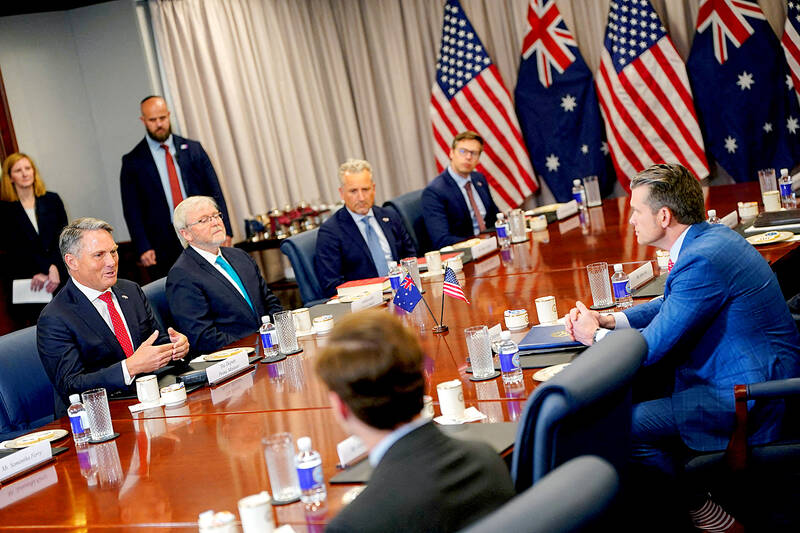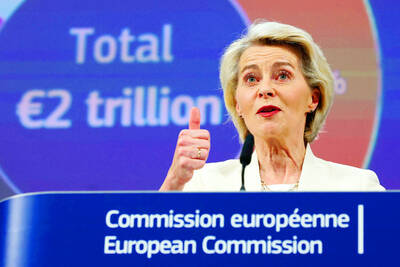Australia yesterday said that it is “very confident” in the future of a US agreement to equip its navy with a fleet of nuclear-powered submarines, after the administration of US President Donald Trump put the pact under review.
The 2021 AUKUS deal joins Australia, the UK and the US in a multi-decade effort to balance China’s growing military might.
It aims to arm Australia with a fleet of cutting-edge, nuclear-powered submarines from the US and provides for cooperation in developing an array of warfare technologies.

Photo: Reuters
However, Trump’s administration has advised Australia and the UK that it is reviewing AUKUS, a spokesperson for the Australian Department of Defence said.
Australian Minister for Defence Richard Marles said he was “very confident” that Australia would still get the US-made submarines.
“I think the review that’s been announced is not a surprise,” he told public broadcaster ABC. “We’ve been aware of this for some time. We welcome it. It’s something which is perfectly natural for an incoming administration to do.”
Australia plans to acquire at least three Virginia-class submarines from the US within 15 years, eventually manufacturing its own subs.
The US Navy has 24 Virginia-class vessels, which can carry cruise missiles, but US shipyards are struggling to meet production targets set at two new boats each year.
In the US, critics question why Washington would sell nuclear-powered submarines to Australia without stocking its own military first.
Marles said that boosting the production of Virginia-class submarines was a challenge.
“That’s why we are working very closely with the United States on seeing that happen, but that is improving,” he said.
Australia’s focus is on “sticking to this plan and on seeing it through,” Marles said.
He criticized Australia’s previous government for “chopping and changing” its submarine choice.
On the eve of announcing its participation in AUKUS in 2021, the government of the time abruptly scrapped plans to buy diesel-powered submarines in a lucrative deal with France.
The AUKUS submarine program alone could cost the country up to US$235 billion over the next 30 years, according to Australian government forecasts, a price tag that has contributed to criticism of the strategy.
Australia should conduct its own review of AUKUS, said former Australian prime minister Malcolm Turnbull, adding that Britain and now the US had each decided to re-examine the pact.
“Australia, which has the most at stake, has no review. Our parliament to date has been the least curious and least informed. Time to wake up?” he wrote on social media.
Former Australian prime minister Paul Keating, a critic of AUKUS, said that the US review might “save Australia from itself.”
Australia should carve its own security strategy “rather than being dragged along on the coat tails of a fading Atlantic empire,” Keating added.
“The review makes clear that America keeps its national interests uppermost, but the concomitant question is: Why has Australia failed to do the same?” he said.
Any US review of AUKUS carries a risk, particularly since it is an initiative of the administration of former US president Joe Biden, said Euan Graham, senior analyst at the Australian Strategic Policy Institute.
However, it is “fundamentally a good deal for the US,” Graham said, with Australia already investing cash to boost US submarine production as part of the agreement.
“I just do not think it is realistic for Australia, this far backed in, to have any prospect of withdrawing itself from AUKUS,” he told reporters. “I don’t think there is a plan B that would meet requirements and I think it would shred Australia’s reputation fundamentally in a way that would not be recoverable.”

FOREST SITE: A rescue helicopter spotted the burning fuselage of the plane in a forested area, with rescue personnel saying they saw no evidence of survivors A passenger plane carrying nearly 50 people crashed yesterday in a remote spot in Russia’s far eastern region of Amur, with no immediate signs of survivors, authorities said. The aircraft, a twin-propeller Antonov-24 operated by Angara Airlines, was headed to the town of Tynda from the city of Blagoveshchensk when it disappeared from radar at about 1pm. A rescue helicopter later spotted the burning fuselage of the plane on a forested mountain slope about 16km from Tynda. Videos published by Russian investigators showed what appeared to be columns of smoke billowing from the wreckage of the plane in a dense, forested area. Rescuers in

Philippine President Ferdinand Marcos Jr is to meet US President Donald Trump this week, hoping Manila’s status as a key Asian ally would secure a more favorable trade deal before the deadline on Friday next week. Marcos would be the first Southeast Asian leader to meet Trump in his second term. Trump has already struck trade deals with two of Manila’s regional partners, Vietnam and Indonesia, driving tough bargains in trade talks even with close allies that Washington needs to keep onside in its strategic rivalry with China. “I expect our discussions to focus on security and defense, of course, but also

POINTING FINGERS: The two countries have accused each other of firing first, with Bangkok accusing Phnom Penh of targeting civilian infrastructure, including a hospital Thai acting Prime Minister Phumtham Wechayachai yesterday warned that cross-border clashes with Cambodia that have uprooted more than 130,000 people “could develop into war,” as the countries traded deadly strikes for a second day. A long-running border dispute erupted into intense fighting with jets, artillery, tanks and ground troops on Thursday, and the UN Security Council was set to hold an emergency meeting on the crisis yesterday. A steady thump of artillery strikes could be heard from the Cambodian side of the border, where the province of Oddar Meanchey reported that one civilian — a 70-year-old man — had been killed and

‘OPPORTUNITY TO ENGAGE’: Antonio Costa and Ursula von der Leyen are to meet Chinese President Xi Jinping to discuss EU-China relations and geopolitical challenges Top leaders from China and the EU are to hold a summit in Beijing this week, as the major economic powers seek to smooth over disputes ranging from trade to the Ukraine conflict. Beijing and Brussels have been gearing up to mark the 50th anniversary of the establishment of diplomatic ties, but a suite of squabbles over state subsidies, market access and wartime sanctions have dampened the festivities. A spokesperson for the Chinese Ministry of Foreign Affairs yesterday confirmed that European Council President Antonio Costa and European Commission President Ursula von der Leyen would visit on Thursday. The statement came after the EU